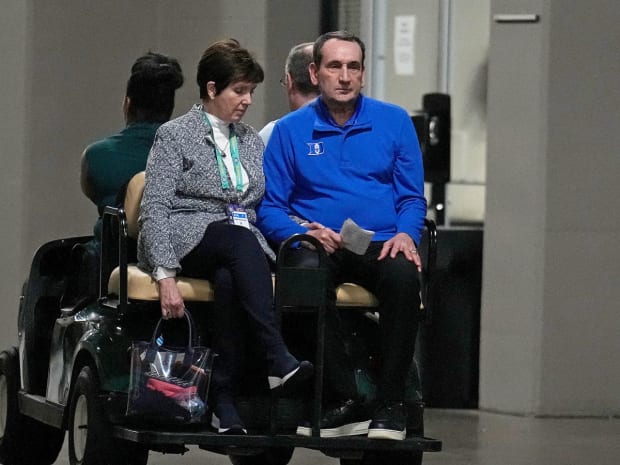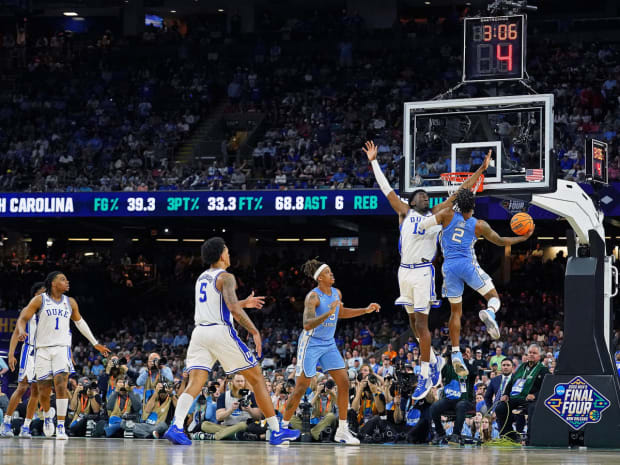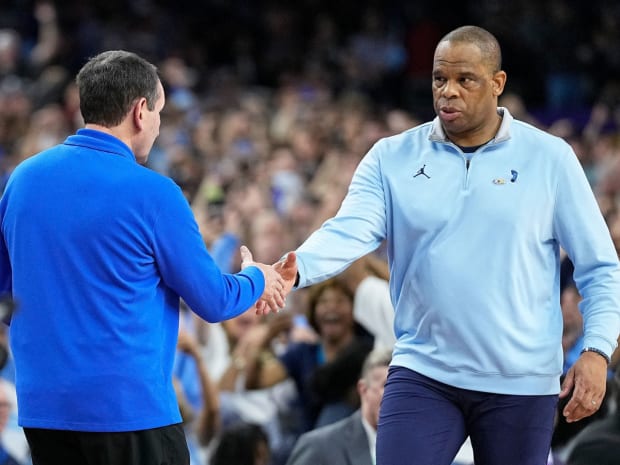There was no Hollywood ending for Krzyzewski, whose career clock ran out to give rise to a new king of Tobacco Road.
NEW ORLEANS — The last Duke shot had caromed off the rim, the rebound cradled by North Carolina. It was, suddenly and swiftly, over. As the Tar Heels launched into celebratory orbit, bounding all over the Caesars Superdome court, Mike Krzyzewski folded his arms across his chest and waited for the final horn to signal the end of his life’s work.
The 75-year-old legend stood and made his way toward triumphant Carolina coach Hubert Davis. They shook hands, and Krzyzewski offered the congratulations he’d received from losing coaches 1,129 times while leading the Blue Devils and 1,202 times overall—more than any men’s basketball coach in NCAA Division I history. Davis is exactly 1,100 career victories behind Coach K’s Duke total, but in that postgame handshake the torch was passed. There’s a new king of Tobacco Road now.
As the Heels rejoiced, the Blue Devils left the court in emotional shambles. They had participated in a brilliant contest, one of the best in Final Four history, but there was no consolation in that after an 81–77 defeat at the hands of their bitter rivals. Center Mark Williams, who had played just 16 minutes due to foul trouble and missed two huge free throws in the final minute, tugged his white jersey up over his eyes. Guard Trevor Keels, who scored 19 points, walked just out of public viewing in the tunnel to the locker room and doubled over sobbing.
The players walked past Mickie Krzyzewski, Mike’s wife, as she stood still as a statue, facing the court, a stricken look on her face. Mike did a short interview with CBS’s Tracy Wolfson, then walked off and met Mickie. This had been the familiar scene as Duke reeled off four NCAA tournament victories, walking off together as Coach K’s career kept being extended, round by round. The last walk was somber, her left hand in his right, as they followed the players to the locker room.

Brynn Anderson/AP
Krzyzewski had seen a lot of playing and coaching careers end in this glorious but ruthless tournament throughout 47 years as a college basketball head coach, 42 of them at Duke. Now it was his turn.
Then the Heels exited the court through the same tunnel, their locker room across the hall from Duke’s, the emotions diametrically opposed. Boisterous, exuberant, they almost floated. Guard RJ Davis and forward Brady Manek came up the ramp with their arms wrapped around each other, faces beaming. Davis was less outwardly giddy, but he did smile and point at someone as he walked by.
This game will be remembered forever on Tobacco Road, and in any other locale where college basketball matters. “I think it reached a level that you would expect,” Krzyzewski said. “Those kids from both teams played their hearts out. I mean, the crowd was standing most of the game, I think. It was a heck of a game.”
Indeed, it was an instant classic, 40 minutes of either held breath or dropped jaws depending on the moment. The hype for this first-ever Duke-Carolina matchup in the tournament had been immense, and then the actual play exceeded it.
Neither team ever led by more than seven points. Every mini-run was answered by another mini-run. Davis was wildly animated coaching his team, while Krzyzewski was more reserved while directing his team from a stool on the elevated court.
There were soaring dunks and spectacular streaks of shot-making, including a late spate of three three-pointers in a span of 46 seconds—with the lead changing hands on each of them. Then Carolina gunner Caleb Love closed the thing down with a three at the 28-second mark, giving his team enough points to win.
The final score was a near-identical callback to the other all-time classic Final Four semifinal Krzyzewski coached, but that time his team was on the winning side: Duke 79, UNLV 77, in 1991. He would go on to win his first of five national championships two days later, over Kansas. The perfect ending to his extraordinary career would have been title No. 6, of course, but sports defies scripting. Carolina wasn’t here to cooperate with a feel-good plotline, just as it failed to submit in Krzyzewski’s final home game four weeks ago.

Bob Donnan/USA TODAY Sports
Krzyzewski wasn’t overly emotional postgame. There were no public tears from him. He was focused on gratitude to his players, and was appreciative of the nobility of great athletic competition.
“I'll be fine,” K said. “I've been blessed to be in the arena. And when you're in the arena, you're either going to come out feeling great or you're going to feel agony, but you always will feel great about being in the arena.
“And I'm sure that that's the thing when I'll look back that I'll miss. I won't be in the arena anymore. But, damn, I was in the arena for a long time. And these kids made my last time in the arena an amazing one.”
This Duke team had played some exalted basketball in the NCAA tournament, rebounding impressively from the loss to Carolina in Cameron and an upset in the Atlantic Coast Conference tournament final against Virginia Tech. After rolling past Cal State–Fullerton in the opening round, the Devils rallied from a late, five-point deficit to defeat Michigan State. Then they put together a dazzling late offensive stretch in the Sweet 16 to defeat Texas Tech and its No. 1 ranked defense. K’s last win was over Arkansas, sending him to a record 13th Final Four.
“How these guys turned it around after we didn't play well … was really one of the best things that's happened for me as a coach in the last five, six years,” Krzyzewski said.
Leaving San Francisco after defeating Arkansas and headed to New Orleans, the stars seemed to have aligned for the Hollywood ending. Krzyzewski’s retirement, announced last June, had been a dominant storyline all season that took on increasing magnitude come March. The tension of a single-elimination tourney meant that every time Duke played, it could be K’s last game. And then his team kept on winning, extending his career, pumping oxygen into the hope that he would go out a champion.
“Smells like destiny,” former Duke great Grant Hill had said the day the Devils won the West Region.
But now the Tobacco Road team of destiny wears powder blue, not royal blue. A dozen games removed from an embarrassing home loss to Pittsburgh that threatened to knock the Heels out of NCAA tournament consideration, Carolina now is the first No. 8 seed to make the championship game in eight years.
The postgame pace of movement in the Superdome hallways was a study in contrast. The Heels were in a hurry, happy to get to the interview room and talk about their biggest win ever over Duke, then briskly preparing to leave the building. There is one more game to rest up for, Monday night against Kansas, as Carolina tries to win its most improbable national title yet. For Duke, there was no urgency. It’s the offseason now.
After North Carolina’s press conference ended, Davis boarded a golf cart headed back to the locker room. Krzyzewski was on one headed the other way, toward the interview room. Two carts passing in the night, carrying a coach on the ascent in his career and one who had reached the end.

David J. Phillip/AP
After the Duke press conference ended, Blue Devils Paolo Banchero, Keels and Wendell Moore Jr. got back on a cart for the ride to the locker room. Keels and Moore hung their heads. Banchero put his left hand on his forehead, the embodiment of tourney heartbreak.
Their coach came out a few minutes later and again climbed onto the back of cart next to Mickie. Looking up, he saw a phalanx of media members taking pictures of the scene. Always possessing a quick wit, K said to the assemblage of reporters and photographers, “Maybe you can superimpose a sunset.”
The cart whisked the Krzyzewskis back to the locker room, where preparations were underway to head back to the team hotel. Golf carts kept rolling from the locker room to the loading dock, where where tired Superdome employees were making their way out after a long day. The area smelled like stale beer and bus exhaust.
At 11:40 p.m., Krzyzewski and Mickie left on the 10th golf cart making trips from the locker room to the bus. At 11:43, he climbed aboard the bus and sat next to his wife in the second row. He rubbed his face with his left hand, folded his arms across his chest, then stood up and went back a few rows to address his players one more time.
Outside the bus, a security guard signaled to the police motorcycle escort to start their engines and turn on their flashing lights. They took the lead and the Duke bus followed, driving off into the warm and breezy Louisiana night. Their time in this tournament was done.
Mike Krzyzewski had left the building. Left the sport. Left the sport better than he found it.
More Coach K Coverage:
• Even in Defeat, Coach K’s Final Chapter Will Endure
• Coach K, the Ultimate Team Builder
• Every Duke SI Cover During Coach K’s Tenure
• The Best of SI’s All-Time Coach K Coverage